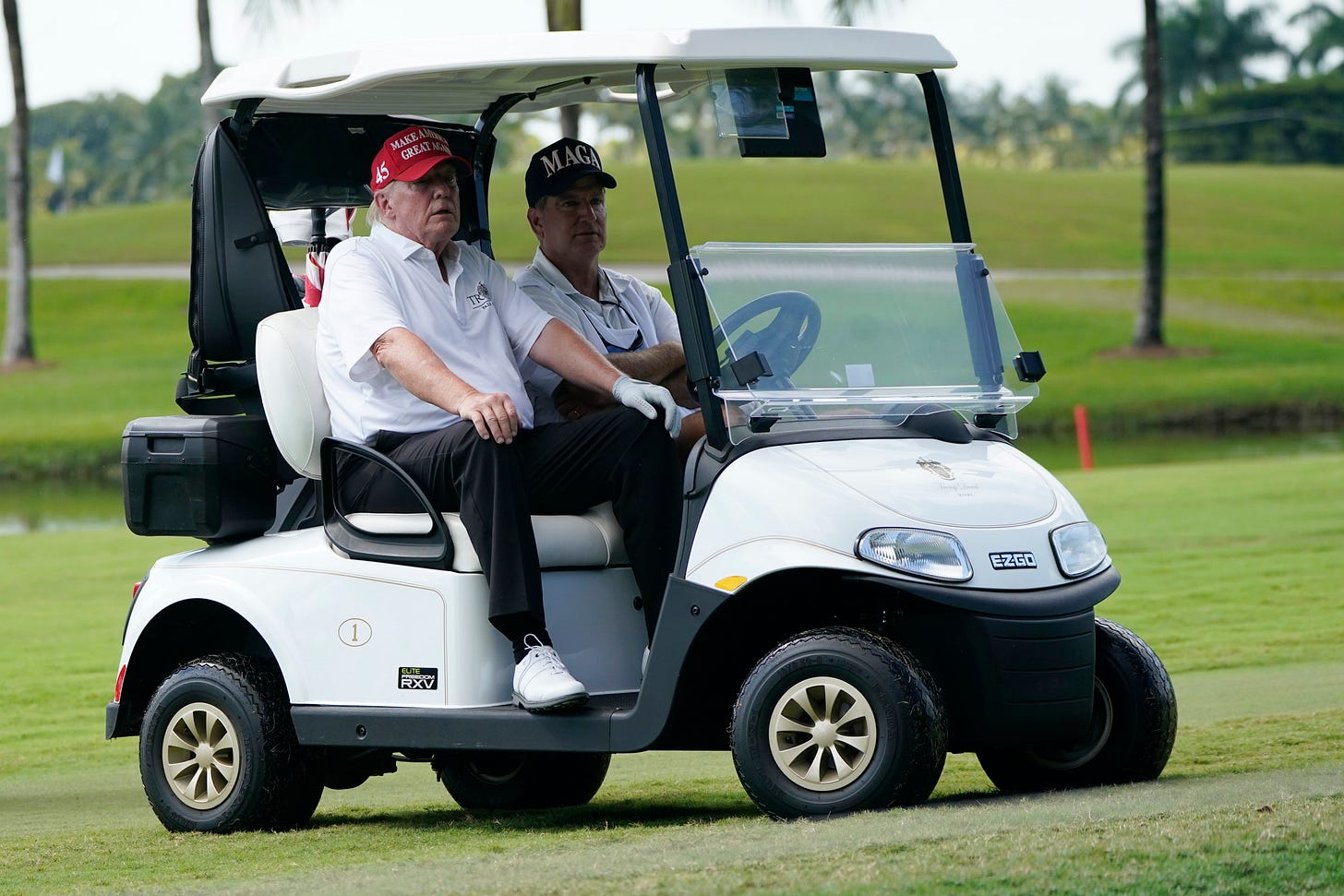Trump administration takes a swing at Chinese golf carts
As Americans embrace low-speed EVs from China, domestic manufacturers seek import protection.

(Bill Sternberg is a veteran Washington journalist and former editorial page editor of USA Today.)
PORT ST. LUCIE, Fla. (Callaway Climate Insights) — Last spring I wrote about the surging popularity of battery-powered Chinese golf carts within our 55+ community here, and how that spells trouble for Detroit’s ability to compete in the global EV market against the likes of China’s BYD.
Not long afterward, leading U.S. golf cart producers petitioned the government for relief from the influx of “low-speed personal transportation vehicles” (LSPTVs) from China, which increased from $148 million in 2020 to $916 million in 2023.
“The Chinese have flooded the market and really had devastating effects on the U.S. industry, both in the neighborhoods and the golf courses,” says Robert E. DeFrancesco, lead counsel to a coalition of major U.S. manufacturers of LSPTVs.
Golf carts represented a small slice of America’s $582 billion in trade with China last year. But their growing popularity illustrates how improved lithium batteries and other amenities are driving sales of climate-friendly plug-ins.
The trade case also represents, in a nutshell, the paradoxes in the policies of President Donald Trump, an avid golfer who is often photographed in carts made by U.S.-based E-Z-Go or Club Car. (DeFrancesco told me he doesn’t know if Trump is aware of the companies’ trade case.)
By imposing stiff duties and tariffs on the Chinese imports, the Commerce Department is protecting manufacturing jobs in the Augusta, Ga., area, home to the famed Masters Tournament and headquarters for the domestic cartmakers. The new trade barriers are also prompting the Chinese companies to move certain operations to Vietnam or, in some cases, the United States, which fits with the Trump administration’s efforts to reindustrialize the U.S. economy. At the same time, the case shows how tariffs can ignite inflation, scramble supply chains, stifle innovation and trigger workarounds.
In their trade complaint, lawyers for Club Car LLC and Textron TXT 0.00%↑ Specialized Vehicles, which manufactures E-Z-Go and Cushman carts, argued that “U.S. production, shipments, capacity utilization, employment, and profit margins have all declined sharply” because of “dumped and subsidized” imports.
E-Z-GO’s Express 2 retailed at $10,544 while a substantially similar Evolution Classic 2 Pro retailed at $6,695, or 36.5% less, according to legal filings. Similarly, a Club Car Onward 4 Forward retailed at $13,800, or 20.3% higher than a comparable Kandi Kruiser 4PRO Forward A, which retailed at $10,999. In addition, the Chinese carts typically come with subsidized financing and plentiful options.
Trade fights are all about trade-offs. A response from Star EV Corp. shows the flip side of protectionism and the reality of global supply chains. Star, a popular import brand, sources seats and other materials from American suppliers, steering wheels from Italy, tires and rims from Thailand, and accessories from Kosovo.
Star EV has more than 100 employees in the U.S., focuses on the neighborhood EV market rather than fleet sales, and believes that the U.S. companies use parts from China in their vehicles. The U.S. companies “have simply not innovated their products to be attractive in the (neighborhood EV) field,” says Nadine Jacobs, Star’s executive director. “Their focus was on their fleet market.”
In January, the Commerce Department issued a preliminary finding that Chinese producers have sold LSPTVs into the U.S. market at less than fair value, in violation of U.S. trade laws. Commerce is expected to issue its final countervailing duty determination in early July. Already, the Chinese brands are being hit with duties averaging 280% on top of 27.5% tariffs.
“We are seeing the import volume come down quite significantly,” says DeFrancesco, a partner at the Wiley Rein law firm. “We’re hopeful that will help the U.S. industry get back on its feet.”
The United States absorbs three-quarters of the golf carts exported from China, and the Chinese brands have had an enthusiastic following among aging Boomers inside master-planned communities. On a recent Saturday morning, about 90% of the carts parked at our sports and fitness complex bore the insignias of Evolution, Icon, Denago and other carts made in China or assembled in the USA from Chinese-made parts.
The American companies refer to the imported carts as “low quality,” but most residents here seem satisfied with their purchases. Carts with four forward-facing seats made by Evolution — a subsidiary of HDK Electric Vehicles or Xiamen Dalle New Energy Automobile Co., one of the largest producers in China — are particularly popular.
My own Evolution Maverick 4 already has more than 1,500 miles on it. The only problem so far has been with the touchscreen. The original screen experienced some sort of nervous breakdown, and the replacement appears blank if you’re looking straight at it with polarized sunglasses.
I’m hoping this sporty little EV will last for several more years, or at least until I’ve paid off the zero-interest, 36-month loan. Because my next cart is likely to cost a whole lot more money.
Read more from Bill Sternberg:
Four reasons EV sales will stall under Trump 2.0 – and one big wild card
Would $200 billion energy loan program survive Trump redux? Don’t bank on it.
Follow us . . . .

fabulous David.....perhaps we need a golf cart index to measure global trade going forward....ha ha...
Stunning ! I still recall vividly when there was a nearly identical problem facing POLISH golf carts back in the 1970s !
AND I visited the Polish plant and wrote a big story about this for The New York Times when I covered Eastern Europe as bureau chief back then!! Here you go !!
https://www.nytimes.com/1979/01/28/archives/those-polish-golf-carts-are-no-joke-a-dumping-charge-is-hard-to.html?searchResultPosition=1
Some things never change, they just keep coming around ... hence: https://daandelman.substack.com/
;-))
d.